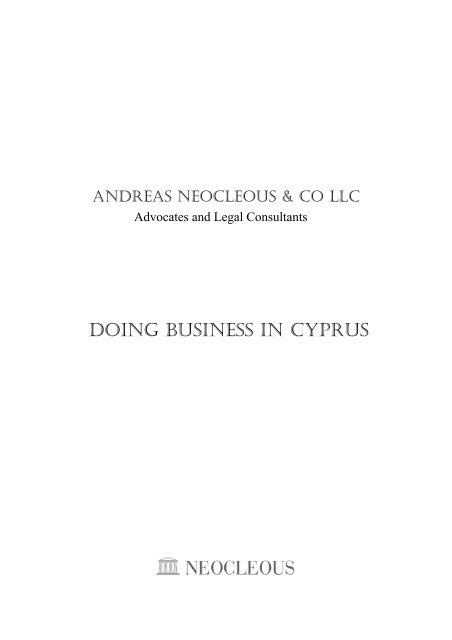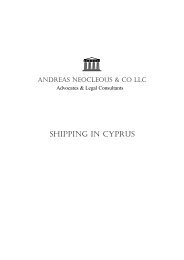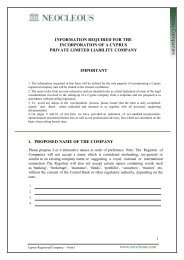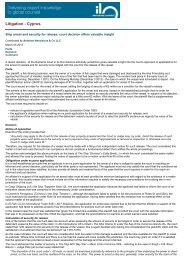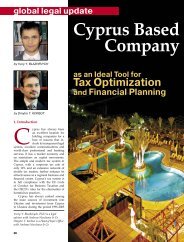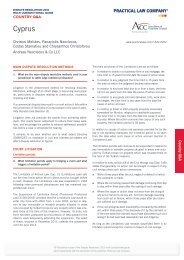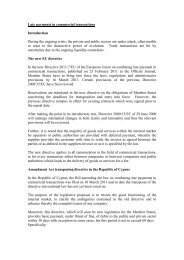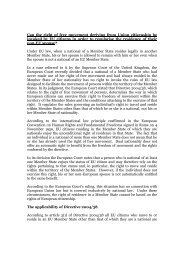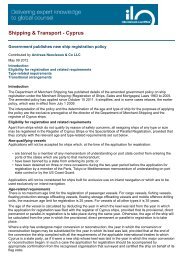DOING BUSINESS IN CYPRUS - Andreas Neocleous & Co
DOING BUSINESS IN CYPRUS - Andreas Neocleous & Co
DOING BUSINESS IN CYPRUS - Andreas Neocleous & Co
Create successful ePaper yourself
Turn your PDF publications into a flip-book with our unique Google optimized e-Paper software.
Doing Business in Cyprus<br />
ANDREAS NEOCLEOUS & CO LLC<br />
Advocates and Legal <strong>Co</strong>nsultants<br />
<strong>DO<strong>IN</strong>G</strong> <strong>BUS<strong>IN</strong>ESS</strong> <strong>IN</strong> <strong>CYPRUS</strong><br />
1
Doing Business in Cyprus<br />
ISSN: 1450 4375<br />
© ANDREAS NEOCLEOUS & CO LLC Revised January 2012<br />
The information in this brochure is subject to change without notice. Application of the<br />
information to specific circumstances requires the advice of lawyers who must rely upon<br />
their own sources of information before providing advice. The information is intended only<br />
as a general guide and is not to be relied upon as the basis for any decision without<br />
verification from reliable professional sources familiar with the particular circumstances and<br />
the applicable laws in force at the relevant time.<br />
2
<strong>Andreas</strong> <strong>Neocleous</strong> & <strong>Co</strong> LLC<br />
Local and international offices<br />
Doing<br />
Limassol,<br />
Cyprus<br />
Nicosia,<br />
Cyprus<br />
Paphos,<br />
Cyprus<br />
Moscow,<br />
Russia<br />
Brussels,<br />
Belgium<br />
Budapest,<br />
Hungary<br />
Kiev,<br />
Ukraine<br />
Prague,<br />
Czech Republic<br />
Sevastopol,<br />
Ukraine<br />
www.neocleous.com<br />
<strong>Neocleous</strong> House, 195 Archbishop Makarios III Avenue,<br />
P.O. Box 50613, CY-3608, Limassol, Cyprus<br />
Telephone: +357 25 110000 Fax: +357 25 110001<br />
E-mail: info@neocleous.com<br />
Xenios Business Center, Archbishop Makarios III Avenue,<br />
P.O.Box 26821, CY-1648, Nicosia, Cyprus<br />
Telephone:+357 22 110000 Fax: +357 22 110001<br />
E-mail: nicosia@neocleous.com<br />
SP Center, Offices 410-411, 17, N Nikolaidi Street,<br />
P.O.Box 61297, CY- 8132, Paphos, Cyprus<br />
Telephone: +357 26 110000 Fax: +357 26 110001<br />
E-mail: paphos@neocleous.com<br />
Perevedenovskiy per., 13, Building 21,<br />
105082 Moscow, Russia<br />
Telephone: +7 495 933 8703 Fax: +7 495 411 8504<br />
E-Mail: russia@neocleous.com<br />
Avenue Louise 475/15,<br />
B 1050 Brussels, Belgium<br />
Telephone: +32 2 669 77 60 Fax: +32 2 626 37 12<br />
E-mail: brussels@neocleous.com<br />
Balassi B.u. 25,<br />
H-1055 Budapest, Hungary<br />
Telephone: +36 1 311 3135 Fax: +36 1 354 0677<br />
E-mail: budapest@neocleous.com<br />
6 Rylsky Lane Floor 7,<br />
01025 Kiev, Ukraine<br />
Telephone and fax: +380 44 253 4495<br />
E-mail: kyiv@neocleous.com<br />
Betlémská 1, 110 00 Praha 1, Czech Republic<br />
Telephone: +420 222231025 Fax: +420 222231024<br />
E-mail: prague@neocleous.com<br />
45 Sovetskaya Str., Ap.4, Sevastopol 99011,<br />
Crimea, Ukraine<br />
Telephone: + 380 69 255 0182 Fax: + 380 69 253 5039<br />
E-mail: sevastopol@neocleous.com<br />
3
Doing Business in Cyprus<br />
4
Doing Business in Cyprus<br />
<strong>Co</strong>ntents<br />
<strong>IN</strong>TRODUCTION<br />
COMMERCIAL ENVIRONMENT<br />
Taxation<br />
Exchange control<br />
Anti money-laundering measures<br />
Immigration<br />
Work permits<br />
7-8<br />
9-12<br />
10<br />
10<br />
10<br />
11<br />
11<br />
FOREIGN <strong>IN</strong>VESTMENT 13-14<br />
Investment by EU nationals<br />
Investment by third country nationals<br />
Restricted investments<br />
Incentives<br />
<strong>BUS<strong>IN</strong>ESS</strong> ENTITIES 15-18<br />
Limited liability company<br />
Branch of an overseas company<br />
Partnership<br />
Sole proprietorship<br />
TAXATION 19-29<br />
Individuals<br />
<strong>Co</strong>mpanies<br />
Special Defence <strong>Co</strong>ntribution<br />
Capital Gains Tax<br />
Advance rulings<br />
Value Added Tax<br />
Stamp duty<br />
Bank deposit levy<br />
Taxation of international shipping activities<br />
DOUBLE TAXATION TREATIES 31-34<br />
Agreements in force<br />
Pending agreements<br />
Benefits<br />
Table of treaty tax rates<br />
13<br />
13<br />
13<br />
13<br />
15<br />
17<br />
17<br />
17<br />
19<br />
21<br />
23<br />
24<br />
25<br />
26<br />
26<br />
26<br />
26<br />
29<br />
29<br />
29<br />
33<br />
5
Doing Business in Cyprus<br />
6
Doing Business in Cyprus<br />
Introduction<br />
Cyprus is the third largest island in the Mediterranean Sea, with an area of 9,251 square<br />
kilometres. It is strategically located in the Eastern Mediterranean at the crossroads of<br />
Europe, Asia and Africa. Its total population is estimated at 1.1 million (July 2010) of whom<br />
approximately 839,000 live in the area controlled by the Republic of Cyprus and the remainder<br />
in the occupied area.<br />
The island was invaded in 1974 by the Turkish army and about 37% of the territory remains<br />
under Turkish occupation. The so-called Turkish Republic of North Cyprus is recognised<br />
only by Turkey, and all the references in this brochure to Cyprus relate to the legitimate<br />
government of the Republic of Cyprus. While political uncertainty continues to surround<br />
"the Cyprus problem", and it is hoped that there will be a satisfactory resolution in the near<br />
future, day-to-day business life is unaffected by the issue.<br />
Cyprus is very well placed as an international business and financial centre. Apart from its<br />
strategic geographical location, relaxed way of life and attractive climate, it offers an<br />
excellent commercial infrastructure, a highly educated English-speaking labour force, a<br />
business-friendly environment, particularly in the area of taxation, a high standard of living<br />
and a low rate of crime. Living costs are moderate, and good airline connections and<br />
telecommunications and increasing alignment with the European position in matters of<br />
culture and trade make it an effective bridge between West and East. Its time zone is 7 hours<br />
ahead of New York, 2 hours ahead of London, 1 hour behind Moscow and 5 hours behind<br />
Beijing. The official languages are Greek and Turkish, but English is the lingua franca of<br />
business.<br />
Cyprus is an independent, sovereign republic with a presidential system of government and<br />
a written constitution which safeguards the rule of law, political stability, human rights and<br />
the ownership of private property. Cyprus has been a member of the European Union since<br />
1 May 2004. In preparation for EU membership Cyprus made significant structural and<br />
economic reforms that transformed its economic landscape and created a modern, open and<br />
dynamic business environment. Since accession, Cyprus has successfully faced the<br />
challenge of European integration, and has established itself as the natural portal for inward<br />
and outward investment between the EU and the rest of the world, particularly the rapidlygrowing<br />
economies of Russia, Eastern Europe, India and China. Cyprus is a member of the<br />
<strong>Co</strong>mmonwealth, the <strong>Co</strong>uncil of Europe, the IMF, the UN, the World Bank and the WTO,<br />
and a founder member of the Organization for Security and <strong>Co</strong>-operation in Europe.<br />
On 1 January 2008 Cyprus adopted the euro as its currency.<br />
The legal system, modelled on the English common law system since independence in<br />
1960, is harmonised with the acquis communautaire of the EU. Cyprus is a signatory to a<br />
large number of international conventions and treaties, including an extensive network of<br />
more than 40 double taxation treaties.<br />
Cyprus is a low-tax jurisdiction whose fiscal and regulatory regimes are aligned with EU<br />
norms, particularly the <strong>Co</strong>de of <strong>Co</strong>nduct for Business Taxation, and fully satisfy the<br />
7
Doing Business in Cyprus<br />
requirements of the OECD, the Financial Action Task Force of the OECD and the Financial<br />
Stability Forum. It has been on the OECD White List of jurisdictions complying with<br />
international best practice since its inception. The regulatory framework is designed to<br />
maintain the respectable and responsible reputation of Cyprus while allowing businesses to<br />
conduct their activities in an environment as free as possible from onerous bureaucratic<br />
restrictions.<br />
8
<strong>Co</strong>mmercial environment<br />
Cyprus has an open, free-market, service-based economy with some light manufacturing.<br />
According to the International Monetary Fund, in 2009 GDP per capita was USD 29,620,<br />
twenty-sixth in the world and on a par with Greece, Hong Kong and New Zealand. The<br />
United Nations Human Development Index for 2009 ranks Cyprus thirty-second in the<br />
world as regards quality of life.<br />
The government's economic policy is aimed at promoting and maintaining favourable<br />
investment conditions and supporting private initiatives. Foreign participation in the<br />
economy has been officially encouraged and liberalised for some time. Administrative<br />
procedures have been simplified and in all but a few strategic or specifically regulated<br />
industries such as banking there are no limits on foreign investment. Citizenship is available<br />
for significant investors. There is a growing awareness among foreign corporations and<br />
individuals of the particular advantages of using Cyprus as a business base for both inward<br />
and outward investment. More than 20% of residents of the government-controlled area are<br />
non-Cypriots. Almost two-thirds of these are EU nationals.<br />
In recent years the inflow of approved foreign investment has increased considerably.<br />
Cyprus has 24 bilateral treaties for the encouragement and reciprocal protection of<br />
investments and more are under negotiation. The purpose of the treaties is to create and<br />
maintain favourable conditions for investments made by nationals of one treaty state in the<br />
other treaty state for their mutual benefit on a long-term basis, to guarantee the protection of<br />
such investments (including the repatriation of profits) and to establish procedures for<br />
settling any disputes that may arise. Cyprus is a signatory to the convention which in 1988<br />
established the Multilateral Investment Guarantee Agency, a member of the World Bank<br />
Group.<br />
There are many well-qualified lawyers who are experienced in all aspects of company law<br />
and tax planning. The principal international accountancy firms practise in Cyprus, as well<br />
as insurance, financial services and fiduciary companies. Limassol, Cyprus's commercial<br />
and shipping centre, is among the world's most important third party ship management<br />
centres.<br />
The Cyprus telecommunications system is excellent and costs are among the lowest in<br />
Europe. CYTA, the government-owned service provider, operates fixed and mobile<br />
networks with a full range of voice and data services. Following liberalisation of the market<br />
a number of other service providers now offer similar services in competition to CYTA.<br />
The government has established a free trade zone close to Larnaca offering excellent<br />
infrastructure, low rents and customs-free status. It also plans to establish a Software<br />
Technology Park to stimulate and encourage the flow of knowledge and technology among<br />
research, development and educational institutions, corporate bodies and other participants<br />
in the IT market.<br />
The country's two international airports, situated near Larnaca and Paphos, which serve<br />
numerous international airlines, w e r e reconstructed and upgraded in the past few years.<br />
9
Doing Business in Cyprus<br />
Seaborne traffic is served by the two multi-purpose ports of Limassol and Larnaca, which<br />
are used as warehouse, distribution and container transhipment centres.<br />
Taxation<br />
The far-reaching tax reform that took effect on 1 January 2003 brought about major changes<br />
to the Cyprus taxation system. An increase in the rate of VAT to 15% (still the lowest rate in<br />
Europe) made possible a reduction of certain taxes and the abolition of others. The old,<br />
complex tax regime was replaced by a new system that eliminates discrimination and<br />
differential treatment between different categories of business and is simple and transparent.<br />
The distinction between local and international companies was abolished and the corporate<br />
tax rate is now uniform and only 10%, the lowest in the EU. The maximum tax rate for<br />
resident individuals is 35%.<br />
Exchange control<br />
With the abolition of exchange controls on 1 May 2004 both residents and non-residents,<br />
whether individuals or corporate bodies, may hold and manage assets and liabilities in any<br />
currency and in any country, including freely convertible and transferable balances with<br />
banks on the island. There is no distinction between nationals of Cyprus, nationals of other<br />
EU member states or third country nationals.<br />
Anti money-laundering measures<br />
The principal anti-money laundering legislation in Cyprus is the Prevention and Suppression<br />
of Legalising Proceeds from Illicit Actions Law of 2007, Law 188(I) of 2007 ("the Law").<br />
The Law, which was passed on 31 December 2007, consolidates, amends and replaces the<br />
Prevention and Suppression of Money Laundering Activities Laws of 1996 to 2004 with<br />
effect from 1 January 2008.<br />
The Law contains both suppressive and preventive provisions against money laundering,<br />
and fully implements the Third Anti- Money Laundering Directive, Directive 2005/60/EC of<br />
the European Parliament and of the <strong>Co</strong>uncil of 26 October 2005 and the Financial Action<br />
Task Force's ("FATF") revised 40 Recommendations against money laundering and its 9<br />
Special Recommendations against terrorist financing.<br />
The Law criminalises money laundering from all crimes punishable with imprisonment in<br />
excess of one year as well as terrorist financing activities. All persons carrying on "relevant<br />
financial business" (including credit institutions, investment firms, insurance companies,<br />
lawyers, accountants, real estate agents and dealers in precious metals and stones) are<br />
obliged to implement strict procedures to preventing the abuse of their services for money<br />
laundering. Persons subject to the Law are required to implement procedures for customer<br />
identification, record keeping and internal reporting. They must ensure that their employees<br />
are aware of their obligations under the Law and provide adequate training to assist them in<br />
recognising money laundering transactions. Organisations must appoint properly qualified<br />
persons as "Money Laundering <strong>Co</strong>mpliance Officers".<br />
The Law designates the Central Bank of Cyprus ("CBC") as the competent supervisory<br />
authority for all banks operating in Cyprus and assigns to it the responsibility of ensuring<br />
banks' compliance with the provisions of the Law. The CBC is also the supervisory<br />
10
Doing Business in Cyprus<br />
authority for providers of money transmission services. The relevant professional bodies are<br />
responsible for their members' activities.<br />
The CBC has issued useful guidance on customer identification, record keeping and other<br />
procedures for the prevention of money laundering, including the identification of beneficial<br />
owners of accounts and transactions and checks on the source and legitimacy of funds<br />
flowing through the banking system in Cyprus. These are available on the website of the<br />
Central Bank of Cyprus.<br />
The Law established a special Unit for <strong>Co</strong>mbating Money Laundering ("MOKAS") as part<br />
of the Attorney General's Office, to take responsibility for the receipt and analysis of<br />
suspicious transaction reports and money laundering and terrorist financing investigations.<br />
The measures taken in Cyprus for combating money laundering and terrorist financing have<br />
been evaluated several times by the FATF and the <strong>Co</strong>uncil of Europe's Moneyval<br />
<strong>Co</strong>mmittee, an FATF regional body whose membership comprises all European states,<br />
including Cyprus, which are not members of the FATF.<br />
In its official report published in June 2000, the FATF recognised that the anti-money<br />
laundering system of Cyprus complies with international standards. Subsequent evaluation<br />
reports adopted by the Moneyval <strong>Co</strong>mmittee commend the legal and other measures taken<br />
by Cyprus in line with international conventions and standards, and the efficiency and<br />
effectiveness of the practical implementation of those measures.<br />
Immigration<br />
Cyprus has aligned its immigration law and regulations with the EU's acquis<br />
communautaire on matters such as entry and stay of third country nationals for selfemployment<br />
and study purposes and long-term residence. Nationals of non-EU countries<br />
who have been residing in Cyprus for at least five years are entitled to Long-Term<br />
Residence Permits which have an indefinite limit; their issue is a requirement imposed on all<br />
EU member states. Visa obligations for foreign nationals are in line with EU obligations.<br />
Cyprus is a signatory to the Schengen agreement and is currently going through the preimplementation<br />
evaluation procedure.<br />
Work permits<br />
Citizens of EU member states may work in Cyprus. If they are employed, they must obtain<br />
residence permits, to which they are entitled as of right. Nationals of other countries wishing<br />
to work in Cyprus require employment permits. These are granted for employment by a<br />
specific employer and are normally issued for one year, although they can be renewed.<br />
As part of its drive to attract foreign investment the government has put in place a "fasttrack"<br />
scheme for dealing with applications by foreign companies to employ workers from<br />
third countries, offering:<br />
<br />
<br />
<br />
simplified procedures and conditions for granting work and residence permits for third<br />
country employees of foreign companies;<br />
reduction of the time taken to examine applications;<br />
indefinite work and residence permits for senior management and other key<br />
11
Doing Business in Cyprus<br />
<br />
<br />
<br />
employees;<br />
streamlined procedures for domestic staff employed by senior management personnel;<br />
reduction of documentation required to support applications to the essentials; and<br />
relaxation of re-entry visa requirements for third country workers who frequently<br />
travel outside Cyprus.<br />
In particular, Russian businessmen in senior management positions who reside mainly in<br />
Cyprus may apply for permanent residence permits, and a fast-track procedure has been<br />
established for applications to be examined by the Immigration <strong>Co</strong>ntrol <strong>Co</strong>mmittee. The<br />
<strong>Co</strong>mmittee liaises closely with the Russian Chamber of <strong>Co</strong>mmerce and the Embassy of the<br />
Russian Federation in Cyprus in order to resolve any problems that may arise.<br />
12
Doing Business in Cyprus<br />
Foreign investment<br />
In the run-up to EU membership, in order to attract inward investment and enhance<br />
economic prosperity in Cyprus, the government liberalised foreign direct investment policy<br />
for both EU and non-EU nationals. In general, foreign investors no longer need approval<br />
from the CBC and may invest and do business in Cyprus on equal terms with local<br />
investors. In regulated sectors such as banking and financial services approvals may be<br />
required for customer protection purposes, but these apply equally to Cypriots, nationals of<br />
other EU member states and third-country nationals. Accordingly, in all but a very few<br />
strategic or regulated sectors of the economy foreign investors may now participate with no<br />
limits on equity holdings and without any prescribed minimum level of capital investment.<br />
To further facilitate inward investment the Ministry of <strong>Co</strong>mmerce, Industry and Tourism<br />
has recently established a Foreign Investors Service Centre tasked with co-ordinating and<br />
simplifying potential investors' dealings with the authorities.<br />
Investment by EU nationals<br />
In line with the freedom of establishment there are no restrictions on investment by citizens<br />
of EU member states other than those applying to specifically regulated sectors, such as<br />
banking, where a "fit and proper" test is applied.<br />
Investment by third country nationals<br />
Direct<br />
Foreign direct investment in Cyprus from non-EU countries was fully liberalised with<br />
effect from 1 October 2004, and minimum investment amounts and maximum participation<br />
percentages were generally abolished, although licences may be still be required for certain<br />
specific investment activities. There is now no difference between companies carrying on<br />
business outside Cyprus (previously known as international business companies ("IBCs")<br />
or offshore companies) and companies carrying on business inside Cyprus.<br />
In the tourist sector the current policy, introduced in 1995, provides for participation up to<br />
49% in projects such as hotels and tourist villages. For projects that enrich the tourist<br />
product, such as golf courses and theme parks, up to 100% participation is permitted.<br />
Portfolio<br />
Up to 100% of the share capital of a company listed on the Cyprus Stock Exchange may<br />
be acquired. The only exceptions are a few regulated sectors such as banking<br />
and media.<br />
Restricted investments<br />
For both EU and third country investors, restrictions remain on acquisitions in the areas of<br />
real estate, tertiary education, public utilities, radio and television stations, newspapers and<br />
magazines and airlines. Each application is considered on its merits.<br />
Incentives<br />
Incentives for locating a business in Cyprus include:<br />
a favourable business environment, with well-educated human capital available at<br />
reasonable rates of pay and world-class infrastructure and services;<br />
13
Doing Business in Cyprus<br />
<br />
<br />
<br />
<br />
<br />
a low-tax environment;<br />
freedom from exchange controls, allowing profits, interest and dividends from<br />
approved investments, capital invested and any capital gains from the disposal of<br />
shares in such investments to be freely remitted overseas;<br />
EU membership, providing a base for the production and export of goods to the<br />
large EU market;<br />
industrial estates, bonded factories and warehouses and the Larnaca Free Zone<br />
("LFZ"), close to the port and international airport, to which equipment and raw<br />
materials may be imported free of customs duty. Products manufactured in the LFZ<br />
may enter the domestic market on payment of the lowest preferential tariff;<br />
a framework of grants and other financial incentives.<br />
14
Doing Business in Cyprus<br />
Business entities<br />
The most common forms of business entity used by foreign investors to conduct business in<br />
Cyprus are a limited liability company, a branch of an overseas company, a partnership and<br />
a sole proprietorship.<br />
Limited liability company<br />
The governing statute is the <strong>Co</strong>mpanies Law (Cap.113) as amended. Under the <strong>Co</strong>mpanies<br />
Law, a company may be limited by shares or by guarantee and may be private or public.<br />
Private company<br />
A private company is one which by its articles of association specifically:<br />
restricts the right to transfer its shares;<br />
limits the number of its members to 50, not including persons who are in the<br />
employment of the company and persons who, having been formerly in the<br />
employment of the company were, while in that employment and have continued after<br />
the determination of that employment to be, members of the company;<br />
prohibits any invitation to the public to subscribe for its shares or debentures; and;<br />
prohibits the issue of bearer shares.<br />
Public company<br />
The <strong>Co</strong>mpanies Law defines a public company as one that is not private. It must fulfil the<br />
following criteria.<br />
It has at least seven members, with no maximum.<br />
It has at least two directors.<br />
Its articles of association must specify the number and the mode of appointment of<br />
directors.<br />
If directors are appointed by the company's articles, the consent of these directors<br />
must be filed on incorporation.<br />
It must obtain a trading certificate from the Registrar of <strong>Co</strong>mpanies before it can<br />
commence business.<br />
It must have a statutory meeting and its directors must make a statutory report to its<br />
members.<br />
It must issue a prospectus or statement in lieu of prospectus before issuing any of its<br />
shares or debentures to the public.<br />
Only public companies may issue share warrants.<br />
European Public Limited <strong>Co</strong>mpany or Societas Europaea (SE)<br />
Cyprus enacted legislation in 2006 to allow the formation of European Public Limited<br />
<strong>Co</strong>mpanies (SEs).<br />
For a company to re-form as an SE in Cyprus, it must be permitted to do so under the law of<br />
its existing registration, and must provide the Cyprus Registrar of <strong>Co</strong>mpanies with<br />
documents similar to those required for re-registration within Cyprus. The legal framework<br />
within which business must be carried on in the <strong>Co</strong>mmunity will be based on Cyprus law.<br />
Furthermore, an SE that markets its securities to the public and to the investment market<br />
must comply with national regulations.<br />
15
Doing Business in Cyprus<br />
Because of the greater degree of separation between their management and their<br />
membership, which may number many thousands, public companies are subject to stricter<br />
governance, capital maintenance and reporting requirements than private companies.<br />
Registration formalities<br />
After approval of the company's name, a Memorandum and Articles of Association must be<br />
submitted to the Registrar of <strong>Co</strong>mpanies, with details of the share capital, directors,<br />
secretary and registered office. A certificate of incorporation is usually issued within a<br />
month, unless expedited.<br />
Share capital<br />
There is no minimum share capital for a private company. For a public company the<br />
minimum is €25,630. There is a capital duty of €103 plus 0.6% of the authorised share<br />
capital.<br />
Capital duty<br />
On incorporation of a Cyprus registered company, capital duty of €103 plus 0.6% of the<br />
authorised capital is payable to the Registrar of <strong>Co</strong>mpanies. Any subsequent increase in<br />
authorised share capital is liable to capital duty at 0.6%. No capital duty is payable on share<br />
premium and capital duty can be minimised by issuing a reduced nominal value of shares at<br />
a premium.<br />
Directors' liability<br />
A director's duties are owed to the company. <strong>Co</strong>mmon law duties include fiduciary<br />
duties (to exercise powers for the benefit of the company, retain freedom of action and<br />
avoid conflicts of interest) and a duty of skill and care, not to act negligently in managing<br />
the company's affairs. There are also statutory duties, some imposing criminal penalties,<br />
and duties owed to creditors.<br />
Reporting requirements<br />
<strong>Co</strong>mpany directors are responsible for maintaining appropriate books and records to<br />
present a true and fair view of the company's affairs, to explain its transactions and to<br />
allow the preparation of financial statements. The directors must present a full set of<br />
financial statements to the annual general meeting of the company; if a company has<br />
subsidiaries, consolidated financial statements are required. Under the <strong>Co</strong>mpanies Law all<br />
limited liability companies must have their financial statements audited by an authorised<br />
independent auditor unless they satisfy at least two of the following criteria:<br />
total assets, before deducting liabilities, do not exceed €3,417,200;<br />
annual turnover does not exceed €6,834,400; and<br />
average number of employees for the year does not exceed 50.<br />
Notwithstanding this "small companies" exemption under the <strong>Co</strong>mpanies Law, the Income<br />
Tax Law requires all companies to submit an annual tax return based on financial statements<br />
audited by authorised auditors. This effectively means that all companies are required to<br />
prepare audited financial statements.<br />
16
Doing Business in Cyprus<br />
An exemption from the obligation to prepare consolidated financial statements is available<br />
for "small sized groups" of companies, of which the companies that are being consolidated:<br />
are not public companies;<br />
are not required to prepare consolidated financial statements under any other<br />
legislation; and<br />
together fulfil at least two of the following criteria at the date of closure of the balance<br />
sheet of the holding company:<br />
total assets (without deducting liabilities) no greater than € 14.6 million;<br />
net turnover no greater than € 29.2 million;<br />
average number of employees no greater than 250.<br />
<strong>Co</strong>mpanies are also required to notify the Registrar of <strong>Co</strong>mpanies within specified time<br />
limits of any charges over their assets, changes in their Memorandum and Articles,<br />
registered office, directors, secretary, members and share capital.<br />
Annual levy on companies<br />
For 2011 and subsequent years an annual levy of €350 will be payable to the Registrar of<br />
<strong>Co</strong>mpanies by all companies incorporated in Cyprus. Dormant companies, companies which<br />
do not own any assets and companies owning property in the occupied areas of Cyprus are<br />
exempt. For groups of companies there is a ceiling of €20,000.<br />
The levy for 2011 is payable by the end of the year; for subsequent years the levy is payable<br />
by 30 June.<br />
Penalties will be imposed in the event of late payment. If the levy is paid no later than two<br />
months after the due date a penalty of 10% will be charged. If the levy is paid between two<br />
and five months after the due date, a penalty of 30% will be charged. <strong>Co</strong>mpanies which<br />
have not paid after five months from the due date may be struck off the register. They can<br />
be restored to the register only by paying an increased levy of €500 per year if they are<br />
restored within two years or €750 per year if they are restored to the register after more than<br />
two years.<br />
Branch of an overseas company<br />
A branch of an overseas company may be registered under the <strong>Co</strong>mpanies Law provided<br />
that satisfactory bank references are supplied and the following documents (translated into<br />
Greek) are filed with the Registrar of <strong>Co</strong>mpanies within one month:<br />
certified copy of the charter, Memorandum and Articles or other instrument defining<br />
the constitution of the company;<br />
particulars of the directors and secretary of the company;<br />
name and address of at least one person resident in Cyprus authorised to accept<br />
service of any notice on behalf of the company.<br />
Partnership<br />
Partnerships in Cyprus are governed by the Partnership and Business Names Law<br />
(Cap.116). They may be either general (in which every partner is liable jointly and<br />
severally with the other partners for all the debts and obligations of the partnership incurred<br />
while a partner) or limited (in which a limited partner contributes a stated amount to the<br />
17
Doing Business in Cyprus<br />
capital and is not liable for the debts and obligations of the partnership beyond the amount<br />
stipulated).<br />
Partnerships may not exceed 20 members. A company may be a general or limited partner.<br />
Non-residents may become members of a Cyprus-registered partnership. Non-EU nationals<br />
require work permits, which are usually granted if the business of the partnership is exportorientated<br />
or is breaking new ground in terms of technical or commercial development.<br />
Partnerships are required to keep proper books of account and make them available for<br />
inspection by the partners. Under the Assessment and <strong>Co</strong>llection of Taxes Law, if annual<br />
turnover exceeds €70,000 per partner audited accounts must be produced.<br />
Joint ventures are treated as a form of partnership.<br />
Sole proprietorship<br />
Cypriots and non-Cypriots may carry on business in their own name or under a business<br />
name registered under the Partnership and Business Names Law (Cap.116). Non-EU<br />
nationals must secure prior permission under the Aliens and Immigration Regulations.<br />
Under the Assessment and <strong>Co</strong>llection of Taxes Law, if annual turnover exceeds €70,000<br />
audited accounts must be produced.<br />
18
Doing Business in Cyprus<br />
Taxation<br />
The tax year for individuals and companies is the calendar year.<br />
Individuals<br />
Cyprus residents are taxed on the basis of worldwide income, irrespective of whether it is<br />
remitted to Cyprus. Husband and wife are taxed separately.<br />
Persons who are not resident in Cyprus are subject to income tax on income accruing or<br />
arising from sources in Cyprus in respect of:<br />
profits or other benefits from a permanent establishment situated in Cyprus or from<br />
any office or employment exercised in Cyprus;<br />
pensions in respect of past employment exercised in Cyprus;<br />
rent from property situated in Cyprus;<br />
consideration in respect of goodwill of a trade in Cyprus reduced by the cost of such<br />
goodwill;<br />
the gross income derived by an individual from the exercise in Cyprus of any<br />
profession or vocation, the remuneration of public entertainers, and the gross receipts<br />
of any theatrical, musical or other group of public entertainers.<br />
Individuals are considered to be resident if they are present in Cyprus for more than<br />
183 days in the relevant year. Days of departure and arrival are treated as follows:<br />
the day of departure from Cyprus counts as a day of residence outside Cyprus;<br />
the day of arrival in Cyprus counts as a day of residence in Cyprus;<br />
arrival in and departure from Cyprus in the same day counts as one day of residence in<br />
Cyprus;<br />
departure from and return to Cyprus in the same day counts as one day of residence<br />
outside Cyprus.<br />
Personal income tax rates are as follows:<br />
Income band<br />
from<br />
to<br />
Tax rate<br />
Relief is given for donations to approved charities, professional and trade union<br />
subscriptions, life insurance premiums and contributions to pension, social insurance and<br />
welfare funds. Relief may also be available under a double taxation treaty.<br />
Resident expatriate employees or secondees are subject to income tax on their worldwide<br />
income at the rates shown above. For the first three calendar years following the start of<br />
their employment, individuals taking up residence and employment in Cyprus will be<br />
19<br />
Cumulative tax<br />
at top of band<br />
0 €19,500 0 0<br />
€19,500 €28,000 20% 1,700<br />
€28,000 €36,300 25% 3,775<br />
€36,300 €60,000 30% 10,885<br />
€60,000 and above 35%
Doing Business in Cyprus<br />
entitled to an annual allowance of the lower of €8,543 or 20% of their remuneration. With<br />
effect from the 2012 tax year, if income from employment exceeds €100,000 per annum, a<br />
50% deduction is allowed for the first 5 years of employment.<br />
Exemptions and special cases<br />
A number of exemptions are available, namely:<br />
interest and dividends receivable by individuals;<br />
lump sums upon retirement of individuals;<br />
capital sums from approved life assurance policies and provident or pension funds;<br />
income from employment services provided abroad to a non-resident employer or an<br />
overseas permanent establishment of a resident employer for a period exceeding 90<br />
days in the tax year;<br />
profit from the sale of shares;<br />
certain pensions, such as widow's pension;<br />
salaries of officers and crew of ships owned by a Cyprus shipping company that sail<br />
under the Cyprus flag and operate in international waters;<br />
income from a qualifying scholarship, exhibition, bursary or similar educational<br />
endowment.<br />
For income tax purposes a 20% deduction is allowed from rental income received.<br />
The first €3,420 per annum of any foreign pension is free of tax and the excess over that<br />
amount is taxed at 5%.<br />
The Merchant Shipping (Fees and Taxing Provisions) Law of 2010 makes available an<br />
alternative tax system, based on tonnage of vessels, to owners, charterers and managers of<br />
ships engaged in qualifying international maritime transport activities.<br />
Investment income of resident individuals is subject to the special defence contribution (see<br />
page 23) which is deducted at source.<br />
Special <strong>Co</strong>ntributions by Private Sector Employees and Pensioners and the Selfemployed<br />
With effect from 1 January 2012 a “special contribution” has been imposed for two years on<br />
remuneration and pensions paid to private sector employees and the self-employed at the<br />
following rates:<br />
Gross monthly a m o u n t<br />
Special contribution<br />
Below €2.500 0<br />
€2.501 – €3.500 2.5% (with a minimum amount of €10)<br />
€3.501 –€ 4.500 3%<br />
€4.501 and over 3.5%<br />
In the case of an employee, special contribution is borne by the employer and the employee in<br />
equal shares.<br />
20
Doing Business in Cyprus<br />
Social Insurance<br />
Under the Social Insurance Scheme, the employer and employee each contribute 6.8% of the<br />
employee's earnings up to a current maximum of €4,004 per month, a total of 13.6%, and the<br />
government pays a further 4.3%, making an aggregate of 17.9%.<br />
A self-employed person contributes 12.6% and the government pays 4.3% on income within a<br />
lower and upper earnings threshold that varies according to the nature of the trade. Voluntary<br />
contributions may be paid at 14.8% on insurable income; the contributor pays 11% and the<br />
government pays 3.8%. An individual who is ordinarily resident in Cyprus but who is<br />
working abroad for a Cyprus-resident employer may pay voluntary contributions of 13.6%. In<br />
this case the government contributes 4.3%.<br />
Employers must also pay 1.7% of their employees' earnings up to a maximum of €4,004 per<br />
month to the Industrial Training Fund and Redundancy Fund and 2% (with no upper earnings<br />
limit) to the Social <strong>Co</strong>hesion Fund, which is used to make social grants.<br />
<strong>Co</strong>ntribution rates are reviewed every five years, with the next review due in 2014.<br />
<strong>Co</strong>mpanies<br />
The Income Tax Law of 2002 completely changed the system of company taxation and<br />
abolished the separate taxation system that had been available to offshore companies<br />
(companies incorporated in Cyprus owned by non-Cypriots and trading exclusively outside<br />
Cyprus). There is now:<br />
a single corporation tax rate of 10% for all companies registered in Cyprus;<br />
no geographical limitation on the exercise of a company's activities: income may be<br />
derived from any source, including a Cyprus-based source;<br />
no restriction on the ownership of a company's shares.<br />
As with personal taxes, liability to corporate income tax is based on residence. Cyprus<br />
resident companies are liable to tax on worldwide income and non-resident companies<br />
are liable to tax on any Cyprus-source income.<br />
For companies, the test for residence is the locus of management and control. A company is<br />
regarded as resident in Cyprus if it is managed and controlled in Cyprus. Mere registration<br />
or incorporation in Cyprus will not be enough to render a company liable to tax in Cyprus.<br />
The criteria for management and control have not been formally defined, but the following<br />
are generally accepted as the key factors determining whether or not the management and<br />
control of a company are exercised in Cyprus:<br />
Are a majority of the directors resident in Cyprus<br />
Are all the strategic decisions affecting the company demonstrably made in Cyprus by<br />
the board of directors<br />
Does the company maintain its headquarters in Cyprus<br />
Does the company operate an account with a bank in Cyprus<br />
A company should have economic substance in terms of staff, premises and equipment and<br />
sufficient competence in Cyprus to make necessary business decisions. Finally, it should<br />
provide a service that is genuinely required by the group and not "devoid of an economic<br />
21
Doing Business in Cyprus<br />
purpose". Otherwise, payment for such services could be viewed as an artificial transfer of<br />
profits from one company to another.<br />
A company resident in Cyprus is taxable on its worldwide income derived or accruing from:<br />
gains or profits from any trade or business;<br />
interest or discount (subject to exemptions – see below);<br />
rents, royalties, premiums or other profits arising from property;<br />
any other income, such as gain on sale of goodwill.<br />
<strong>Co</strong>rporation tax is charged at 10% on the profits of a company's business and gains on<br />
trading in immovable property in Cyprus.<br />
Cyprus branches of foreign companies are subject to tax at 10% on worldwide income if<br />
the locus of management and control of the branch is in Cyprus. If the locus of<br />
management and control is overseas, all the branch income is exempt from tax in Cyprus.<br />
Non-resident companies are liable to corporation tax on profits accruing or arising in Cyprus<br />
from a permanent establishment in Cyprus.<br />
A subsidiary, wherever incorporated, will be subject to Cyprus tax on its worldwide income if<br />
it is managed and controlled in Cyprus, or if profits accrue or arise in Cyprus from a<br />
permanent establishment in Cyprus.<br />
Under the OECD model double taxation treaty, the definition of a permanent<br />
establishment includes a place of management, a branch, an office, a factory, a<br />
workshop, a mine and a building site or construction or installation project if it lasts for<br />
more than three months. The retention of a law firm or similar service provider in<br />
Cyprus for management, domiciliation, legal or other services and the opening of an<br />
account with a bank in Cyprus do not constitute a permanent establishment.<br />
Trading losses incurred by one group company may be set off against trading profits of<br />
another group company to give group relief, provided that the losses and profits accrued in<br />
the same year of assessment and both companies were resident in Cyprus and members of<br />
the same group for the whole of that year.<br />
Two companies are deemed to be members of a group if one is the 75% subsidiary of the<br />
other or both are 75% subsidiaries of a third company. " 75% subsidiary" means holding<br />
at least 75% of the voting shares with beneficial entitlement to at least 75% of the income<br />
and 75% of the assets on liquidation.<br />
Special bases of taxation<br />
Interest received by companies in the ordinary course of their business or closely connected<br />
to the ordinary course of business, net of costs incurred in earning the interest, is subject to<br />
corporation tax at 10%. Interest not satisfying these criteria is subject to SDC at the rate of<br />
15% on the gross amount without any deduction for costs.<br />
Royalties or any other payments to a non-resident for intellectual or industrial property<br />
rights are liable to a 10% withholding tax, subject to relief under any applicable double<br />
taxation treaty. No tax need be withheld if the rights are used exclusively outside Cyprus.<br />
22
Doing Business in Cyprus<br />
Rental payments made to a person not resident in Cyprus in respect of films shown in<br />
Cyprus are subject to withholding tax at 5% of the gross amount.<br />
The Merchant Shipping (Fees and Taxing Provisions) Law of 2010 makes available an<br />
alternative tax system, based on tonnage of vessels, to owners, charterers and managers of<br />
ships engaged in qualifying international maritime transport activities.<br />
Exemptions<br />
In addition, the following types of income are fully exempt from corporate income tax:<br />
profit from the sale of securities;<br />
dividends;<br />
income of any approved pension or provident fund;<br />
profits from a permanent establishment situated entirely outside Cyprus, unless the<br />
permanent establishment directly or indirectly engages more than 50% in activities<br />
which lead to investment income and the foreign tax burden is substantially lower than<br />
the tax burden in Cyprus<br />
income of any company formed exclusively for the purpose of promoting art, science<br />
or sport, and of certain educational and charitable companies;<br />
profits earned or dividends paid by a Cyprus shipping company which owns ships<br />
under the Cyprus flag and operates in international waters, for which the tonnage tax<br />
scheme is mandatory.<br />
Special Defence <strong>Co</strong>ntribution<br />
Special contribution for defence ("SDC tax") is payable by Cyprus resident (determined in<br />
the same way as for income tax) individuals and companies on interest, dividend and rentals<br />
received at the rates set out below. Relief or credit for tax paid abroad may be available<br />
either under the terms of a double tax treaty or by way of unilateral relief.<br />
Type of income<br />
Rate<br />
Dividends 20%<br />
Interest not earned in the ordinary course of business 15%<br />
Rents<br />
3% of 75% of the rent<br />
Dividends<br />
Dividends received by one resident company from another are exempt from SDC tax.<br />
Dividends received by a foreign shareholder (individual or company) from a resident<br />
company are also exempt, and this gives Cyprus a real advantage over other European<br />
holding company regimes which generally impose a withholding tax, even when reduced<br />
by a double taxation treaty, of at least 5%.<br />
Dividends received by a resident company (or a permanent establishment of a non-resident<br />
company) from overseas are exempt from SDC tax in accordance with the EU Parent-<br />
Subsidiary Directive and domestic law. There are no <strong>Co</strong>ntrolled Foreign <strong>Co</strong>mpany (CFC)<br />
provisions under Cyprus law and the only limitation to the exemption for overseas dividends<br />
is where both limbs of the following test ("Passive Dividend Rules") apply, namely where:<br />
the investment income is more than 50% of the paying company's activities; and<br />
23
Doing Business in Cyprus<br />
<br />
the foreign tax burden on the income of the paying company is substantially lower<br />
than the Cyprus tax burden.<br />
A special rate of 3% applies to dividends received by collective investment schemes.<br />
Interest<br />
Interest received in or closely related to, the normal course of business, is n o t s u b j e c t t o<br />
SDC. Other interest is liable to SDC at 15% on the gross amount received, without any<br />
deduction for the costs of earning it.<br />
Rents<br />
Rents are subject to SDC at 3% on 75% of the gross rent. No deduction for expenses is<br />
allowed. <strong>Co</strong>mpanies, partnerships, and central and local government bodies paying rents are<br />
required to withhold SDC at source and pay it to the tax authorities.<br />
Deemed dividend distribution for SDC<br />
If a Cyprus resident company does not distribute a dividend within two years after the end<br />
of a tax year, a "deemed dividend distribution" is calculated, being 70% of after-tax<br />
accounting profits for that tax year, less any dividends that have been paid out of those<br />
profits. SDC tax is charged on the proportion of the deemed dividend distribution that is<br />
applicable to Cyprus-resident shareholders.<br />
When an actual dividend is paid after the deemed dividend distribution, then SDC tax is<br />
payable only on any amount dividend paid over and above the deemed dividend distribution.<br />
If a company is liquidated and funds or assets are returned to shareholders, the profits for<br />
the final three years which have not been distributed or deemed to have been distributed, are<br />
deemed to have been distributed and the shareholders are deemed to have received the<br />
dividends, which will be subject to SDC tax at 17%. The deemed dividend distribution may<br />
not exceed the sum (or the value of the assets) paid to the shareholders.<br />
This deemed distribution does not apply to the liquidation of a company for the purpose of a<br />
qualifying reorganisation, nor to companies in insolvent liquidation.<br />
<strong>Co</strong>llective Investment Schemes pay SDC tax at a reduced rate of 3% on deemed<br />
distributions, whether in respect of income or on liquidation (redemptions of units in<br />
<strong>Co</strong>llective Investment Schemes do not constitute a distribution for the purposes of SDC tax<br />
and so are exempt).<br />
Capital Gains Tax<br />
Subject to certain exemptions and reliefs, net gains from the sale of immovable property in<br />
Cyprus and of shares of unlisted companies owning immovable property in Cyprus are<br />
taxable at 20%. All other gains are exempt.<br />
The following categories of disposals of real estate are exempt from Capital Gains Tax:<br />
transfers by reason of death;<br />
gifts between relatives up to the third degree of kindred;<br />
gifts to family companies (limited companies whose only shareholders at the time of<br />
the gift and for the entire period of five years thereafter are members of the family of<br />
24
Doing Business in Cyprus<br />
<br />
<br />
<br />
<br />
the donor);<br />
gifts by family companies to their shareholders, but only in cases where the property<br />
given was originally acquired by the company as a gift;<br />
gifts to charitable institutions or to the Republic of Cyprus;<br />
exchanges of immovable properties; and<br />
compulsory acquisitions.<br />
In assessing the gain the following will be deducted from the price received:<br />
the market value of the property at 1 January 1980, or, if it was acquired after that<br />
date, the price paid or the consideration given for the acquisition of the property;<br />
the cost of any major improvements;<br />
the subsequent increase in the value of the property due to inflation, calculated by<br />
reference to the Retail Price Index issued every month by the Department of Statistics;<br />
expenses related to the acquisition and disposal of the property such as transfer fees<br />
and legal costs.<br />
Individuals may deduct from the resultant gain the following lifetime exemptions:<br />
in the case of sales of agricultural land by farmers, the first €25,629 of the sale price,<br />
provided that the farmer was residing in the same area at the time of the sale;<br />
in the case of sales of property used as a residence by the vendor, the first €85,430 of<br />
the sale price, provided that the property has been used as the vendor's residence for at<br />
least 5 years prior to the sale; and<br />
in the case of any other disposal, the first €17,086 of the sale price.<br />
The tax is payable within one month from the date of disposal. Interest at 9% per annum is<br />
payable on any tax remaining unpaid after one month from the date of the disposal. If the<br />
sale proceeds are payable by instalments, the tax also may be paid by instalments with<br />
interest. Interest at 9% per annum is payable when excess tax is refunded.<br />
Many of Cyprus's double taxation treaties tax capital gains only in the country of residence<br />
of the disponor of the asset. The exemption from capital gains tax in Cyprus could therefore<br />
completely eliminate any tax liability, for example in the case of a capital gain made by a<br />
Cyprus-resident company from a sale of the shares of its foreign subsidiary. Such a gain will<br />
be exempt from tax both in Cyprus and in the country where the subsidiary and the shares<br />
are based.<br />
As the gain from a sale of goodwill as such is taxable at 10%, it is usually beneficial to<br />
transfer goodwill to a newly-formed company and sell the shares of that company. Any<br />
capital gain on the sale of the shares (which will include the value of the goodwill) will be<br />
exempt from tax.<br />
Advance rulings<br />
The <strong>Co</strong>mmissioner of Income Tax provides written replies on interpretation of the Cyprus<br />
tax law provisions. This practice is not incorporated in the Cyprus tax legislation and it is<br />
not an official ruling regime as used in other EU member states. Even so, the interpretations<br />
should be binding on the tax authorities if the full facts are disclosed on the ruling request. It<br />
is hoped that this practice will develop into a formal advance ruling regime so that<br />
25
Doing Business in Cyprus<br />
taxpayers will be able to obtain binding advance decisions on proposed transactions.<br />
Value Added Tax<br />
The VAT registration threshold is €15,600 per annum. Cyprus's standard rate of 15% is the<br />
lowest in the EU and reduced rates of 5% and 8% apply to certain goods and services.<br />
<strong>Co</strong>mpanies that do not have trading activities within the EU need not register for VAT<br />
but of course they will be unable to recover input tax.<br />
Stamp duty<br />
Stamp duty is payable on contracts relating to property or business in Cyprus. On the first<br />
€170,860, the revenue stamp is €0.02 per €17.09 or part thereof, and on any excess above<br />
€170,860, the revenue stamp is €0.03 per €17.09 or part thereof. Stamp duty is capped at<br />
€17.086 per document. Where no amount is specified in the contract the stamp duty is €34.<br />
A number of categories of documents are exempt from stamp duty, including documents<br />
relating to corporate reorganisations (which are exempt from all forms of taxation) and ship<br />
mortgage deeds or other security documents.<br />
Bank deposit levy<br />
Credit institutions operating in Cyprus are required to pay a levy of 0.095% on their<br />
customer deposits. Each year's levy will be calculated on the basis of customer deposits as at<br />
31 December of the preceding year. No levy is imposed on inter-bank deposits.<br />
The levy is not deductible for the purpose of calculating taxable profits. It will, however,<br />
reduce the amount of profits subject to deemed dividend distribution.<br />
The declaration of taxable deposits on the preceding 31 December must be made by 31<br />
March each year, and the levy will be collected in four equal instalments at the end of each<br />
quarter, starting 31 March. The declaration of taxable deposits may be revised up to 31<br />
December. The <strong>Co</strong>mmissioner of Income Taxes has the power to raise assessments for the<br />
levy and to collect it from banks.<br />
The levy is limited to 20% of taxable profits for the year in respect of which it is paid. The<br />
tax authorities are required to issue final income tax assessments within six months from the<br />
date the corporate income tax return is submitted and any overpayment above the 20% limit<br />
must be refunded within a month after the issue of the final income tax assessment.<br />
Taxation of international shipping activities<br />
Since Cyprus joined the EU in 2004, Cyprus resident shipping and ship management<br />
companies had enjoyed the most benevolent shipping taxation regime in Europe, with<br />
significant exemptions and the option for ship management companies to elect between a<br />
preferential corporate income tax rate of 4.25% or a tonnage tax regime. The Merchant<br />
Shipping (Fees and Taxing Provisions) Law of 2010 ("the Tonnage Tax Law"), which was<br />
enacted on 29 April 2010 and has retroactive effect from 1 January 2010, abolishes the old<br />
preferential corporate income tax rate but significantly extends the availability of the<br />
tonnage tax basis for Cyprus resident shipping and ship management companies,<br />
simplifying and reducing the tax burden. It extends the benefits of the tonnage tax regime<br />
and exemptions from income tax, which were previously restricted to owners, operators and<br />
26
Doing Business in Cyprus<br />
managers of Cyprus-flag ships, to owners and charterers of non-Cyprus flag vessels and<br />
widens the range of exempt gains to include profits on the disposal of vessels, interest<br />
earned on funds and dividends paid directly or indirectly from shipping-related profits, in<br />
addition to profits from shipping operations.<br />
Qualifying persons, activities and vessels<br />
In order to be eligible for the tonnage tax regime, a "qualifying person" must be carrying out<br />
"qualifying activities" in relation to "qualifying vessels".<br />
Qualifying persons are tax-resident owners or charterers (bareboat, demise, time and<br />
voyage) of Cyprus ships, of <strong>Co</strong>mmunity ships or of fleets of ships comprising <strong>Co</strong>mmunity<br />
and non-<strong>Co</strong>mmunity ships, and ship managers providing technical or crewing services or<br />
both. Ship managers are required to maintain a functioning office in Cyprus staffed by a<br />
sufficient number of appropriately qualified personnel. At least 51% of onshore personnel<br />
must be citizens of the European Economic Area ("EEA") (comprising the EU together with<br />
Iceland, Liechtenstein and Norway) and at least two-thirds of the total tonnage under<br />
management must be managed within the EEA.<br />
For owners or charterers of Cyprus ships the tonnage tax scheme is mandatory. Other<br />
owners or charterers and ship managers may opt for taxation based on profits or tonnage<br />
tax, but, having opted for the tonnage tax scheme, they must remain within it for ten years<br />
unless the vessel is sold, or a charter or management agreement is terminated. For a fleet to<br />
qualify for the scheme, at least 60% of its tonnage should comprise <strong>Co</strong>mmunity ships. If<br />
this requirement is not met, the non-<strong>Co</strong>mmunity vessels may still qualify if certain criteria<br />
are met, but surcharges may be payable.<br />
For owners and charterers, qualifying activities are maritime transport of goods or people<br />
between Cyprus ports and foreign ports or offshore installations, or between foreign ports<br />
or offshore installations, including towage, dredging and cable laying. For ship managers,<br />
qualifying activities are the provision of services under a written agreement to a ship owner<br />
or bareboat charterer in relation to crew management, technical management or both. A<br />
qualifying vessel is a sea-going vessel that has been certified in accordance with<br />
international principles and legislation of the flag country and is registered in the register of<br />
a member country of the International Maritime Organisation and International Labour<br />
Organisation. Vessels which transport humanitarian aid are included in the definition, but<br />
the following vessels are excluded:<br />
fishing and fish factory vessels;<br />
vessels used primarily for sport or recreation;<br />
vessels constructed exclusively for inland waterway navigation;<br />
harbour, estuary and river ferries and tug boats;<br />
fixed offshore installations which are not used for maritime transport;<br />
non self-propelled floating cranes;<br />
non-ocean going tug boats;<br />
stationary vessels employed for hotel and/or catering operations (floating hotels or<br />
restaurants);<br />
vessels employed mainly as casinos or gambling facilities.<br />
27
Doing Business in Cyprus<br />
Tax exemption<br />
The Tonnage Tax Law replaces taxes based on profits with a tax calculated on the net<br />
tonnage of the vessels concerned.<br />
For owners and charterers the tax exemption covers profits from the use of a qualifying<br />
vessel, dividends paid out of those profits at all levels of distribution and interest income<br />
relating to the financing, maintenance or use of a qualifying vessel and the related working<br />
capital, excluding interest on capital used for investments. Profits from the disposal of a<br />
qualifying vessel or any share or interest in it and profits from the disposal of shares in a<br />
shipowning company are also exempt from tax. In order to qualify for the exemption at least<br />
25% of the net tonnage of vessels subject to tonnage tax must be owned or bareboat<br />
chartered. The percentage can be reduced but not for more than 3 consecutive years. The<br />
qualifying percentage is reduced to 10% if all the vessels of the charterer are registered or<br />
managed in the EEA.<br />
Ship managers may elect to pay tonnage tax at one-quarter of the rates applicable to<br />
shipowners and charterers, in which case profits earned from the provision of technical and<br />
crewing services are exempt from tax in respect of qualifying vessels, together with<br />
dividends paid out of those profits at all levels of distribution.<br />
Profits from commercial management are not covered by the tonnage tax scheme and<br />
remain taxable under corporation tax.<br />
Section 46 of the Tonnage Tax law contains an "all or nothing" provision. Qualifying<br />
owners, charterers and ship managers opting to enter the tonnage tax system must include<br />
all qualifying ships. If a company which is part of a Cyprus tax resident group of companies<br />
enters the tonnage tax scheme, then all other qualifying members of the group must<br />
simultaneously enter the scheme.<br />
Tonnage tax rates<br />
Tonnage tax is charged on a sliding scale on net tonnage. The initial rates charged to owners<br />
and charterers are as follows:<br />
Tonnage tax rate per tonne<br />
First 1,000 tonnes €0.3650<br />
Next 9,000 tonnes €0.3103<br />
Next 15,000 tonnes €0.2008<br />
Next 15,000 tonnes €0.1278<br />
Each tonne above 40,000 €0.0730<br />
By way of example, the annual tonnage tax on a ship of 50,000 tonnes would be €8,816.70.<br />
Cyprus-flag ships are also subject to an annual registry maintenance fee of €300.<br />
For ship managers and ship management companies the rates are one-quarter of those set<br />
out in the table above.<br />
Other provisions<br />
The Tonnage Tax law contains "ring-fencing" provisions to prevent exemption being gained<br />
28
Doing Business in Cyprus<br />
in respect of ineligible activities. Separate accounts must be maintained in respect of<br />
qualifying and non-qualifying activities, and transactions with related parties who are not in<br />
the tonnage tax system must be made at arm's length.<br />
The tonnage tax system is administered by the Department of Merchant Shipping and<br />
taxpayers within its scope will receive an annual certificate, a copy of which will be sent to<br />
the income tax authorities.<br />
The Department of Merchant Shipping will maintain records of all Cyprus flag vessels and<br />
their owners which are not deemed to carry out a qualifying activity, and of all ship<br />
managers, shipowners or charterers of foreign flag vessels who do not carry out a qualifying<br />
activity or have not opted for the tonnage tax system.<br />
Following enactment of the Tonnage Tax law, section 19 of the Income Tax Laws of 2002 –<br />
2010, which gave ship managers the option on a year by year basis of paying corporate<br />
income tax at a reduced rate of 4.25% on net earnings instead of tonnage tax, has been<br />
repealed by the Income Tax (Amendment) Law of 2010 (Law 41 (I) of 2010.<br />
29
Doing Business in Cyprus<br />
30
Doing Business in Cyprus<br />
Double taxation treaties<br />
Cyprus’s double taxation treaties provide relief from double taxation by p r o v i d i n g<br />
that income may only be taxed in one country, or, in the case of<br />
income taxable in both cou n t r i e s , b y applying the credit method. Cyprus<br />
residents' liability for Cyprus income tax and SDC is reduced by tax suffered in the other<br />
country, so that the taxpayer pays only the higher of the two rates and is not taxed twice on<br />
the same income.<br />
Even where there is no double tax treaty in place the Cyprus tax authorities will allow unilateral<br />
relief in the form of a credit against Cyprus tax up to the amount of tax in the country of origin<br />
on the income concerned.<br />
Agreements in force<br />
Cyprus has concluded double taxation treaties covering the following countries:<br />
Armenia Germany Montenegro South Africa<br />
Austria Greece Norway Sweden<br />
Azerbaijan Hungary Poland Syria<br />
Belarus India Qatar Tajikistan<br />
Belgium Ireland Romania Thailand<br />
Bulgaria Italy Russian Federation Turkmenistan<br />
Canada Kuwait San Marino Ukraine<br />
China Kyrgyzstan Serbia UK<br />
Czech Republic Lebanon Seychelles USA<br />
Denmark Malta Singapore Uzbekistan<br />
Egypt Mauritius Slovakia<br />
France Moldova Slovenia<br />
Further details may be found on pages 33 and 34.<br />
Pending agreements<br />
In addition, treaties are under negotiation, or awaiting ratification, with a number of other<br />
countries, including Algeria, Bahrain, Brazil, Estonia, Finland, Georgia, Iceland, India,<br />
Indonesia, Iran, Jordan, Kazakhstan, Latvia, Libya, Lithuania, Luxembourg, Malaysia,<br />
Morocco, Netherlands, Portugal, Spain, Sri Lanka, The United Arab Emirates and Vietnam..<br />
Benefits<br />
Cyprus's double taxation treaty network allows international transactions to be structured<br />
in a number of tax-efficient ways, particularly when combined with a Cyprus holding<br />
company. A Cyprus corporate structure may beneficially be used:<br />
as an intermediary for joint venture or other participations to avoid or reduce<br />
withholding taxes;<br />
to finance joint venture or other acquisitions so as to reduce or eliminate<br />
withholding taxes and extract profits that would otherwise be subject to significant<br />
31
Doing Business in Cyprus<br />
<br />
<br />
<br />
<br />
foreign taxation;<br />
as a holding company whose income may be exempt, subject to the passive dividend<br />
rules;<br />
as an operating company able to claim treaty protection to avoid the creation of a<br />
permanent establishment in a foreign country, with the facility of having an office in<br />
that country to perform limited functions;<br />
as a Cyprus international trust entitled to benefit from treaty protection in some<br />
circumstances;<br />
to operate shipping companies from Cyprus with treaty protection.<br />
Where tax has been suffered on income from a foreign country with which there is no<br />
double taxation treaty, unilateral relief from Cyprus tax will be allowed by way of<br />
exemption, credit or deduction up to the amount of tax suffered in the foreign country<br />
32
Doing Business in Cyprus<br />
<strong>Co</strong>untry<br />
Table of treaty tax rates<br />
All rates are percentages. The numbers after some rates refer to the notes overleaf.<br />
Received in<br />
Cyprus<br />
Dividends Interest Royalties<br />
Paid from Cyprus<br />
Received in<br />
Cyprus<br />
33<br />
Paid from Cyprus<br />
Received in<br />
Cyprus<br />
Paid from Cyprus<br />
Armenia nil nil nil nil nil nil<br />
Austria 10 10 nil nil nil nil<br />
Azerbaijan nil nil nil nil nil nil<br />
Belarus 5 1 5 1 5 5 5 5<br />
Belgium 10 2 10 2 10 3 10 3 nil nil<br />
Bulgaria 5 4 5 4 7 5,6 7 5 10 6 10<br />
Canada 15 nil 15 3 15 3 10 7 10 7<br />
China 10 10 10 10 10 10<br />
Czech Rep. 10 nil 10 3 10 3 5 8 5 8<br />
Denmark 10 2 10 2 10 3 10 3 nil nil<br />
Egypt 15 15 15 15 10 10<br />
France 10 9 nil 10 3 10 3 nil 10 nil 10<br />
Germany 15 11 nil 10 3 10 3 nil 10 nil 10<br />
Greece 25 25 10 10 nil 12 nil 12<br />
Hungary 5 13 nil 10 3 10 3 nil nil<br />
India 10 9 10 9 10 3 10 3 15 15<br />
Ireland nil nil nil nil nil 12 nil 12<br />
Italy 15 nil 10 10 nil nil<br />
Kuwait 10 nil 10 3 10 3 5 8 5 8<br />
Kyrgyzstan nil nil nil nil nil nil<br />
Lebanon 5 5 5 5 nil nil<br />
Malta nil 15 10 3 10 3 10 10<br />
Mauritius nil nil nil nil nil nil<br />
Moldova nil nil nil nil nil nil<br />
Norway 5 14 nil nil 15 25 16 nil nil<br />
Poland 10 10 10 3 10 3 5 5<br />
Romania 10 10 10 3 10 3 5 8 5 8<br />
Russia 5 17 5 17 nil nil nil nil<br />
San Marino nil nil nil nil nil nil<br />
Serbia 10 nil 10 10 10 10<br />
Seychelles nil nil nil nil 5 5<br />
Singapore nil nil 7 18 7 18 10 10<br />
Slovakia 10 nil 10 3 10 3 5 8 5 8<br />
Slovenia 10 nil 10 10 10 10<br />
South Africa nil nil nil nil nil nil<br />
Sweden 5 13 5 13 10 3 10 3 nil nil<br />
Syria 15 19 15 19 10 3 10 3 10 20 10 20<br />
Tajikistan nil nil nil nil nil nil<br />
Thailand 10 10 10 21 10 21 5 22 5 22<br />
Turkmenistan nil nil nil nil nil nil<br />
Ukraine nil nil nil nil nil nil<br />
UK 15 23 nil 10 10 nil 10 nil 10<br />
USA 5 24 nil 10 3 10 3 nil nil<br />
Uzbekistan nil nil nil nil nil nil
Doing Business in Cyprus<br />
Notes<br />
1. 5% if the beneficial owner has a holding in the share capital of the paying company of €200,000 or<br />
more. 10% if the beneficial owner holds directly at least 25% of the share capital. 15% in all other cases<br />
2. 10% if the recipient is a company with at least 25% direct (also indirect for Belgium) share interest.<br />
15% in all other cases<br />
3. Subject to certain exemptions<br />
4. 5% if the beneficial owner is a company which holds directly at least 25% of the capital of the paying<br />
company. 10% in all other cases<br />
5. Nil if interest is paid or guaranteed by the government or a statutory body of the other state.<br />
6. Not applicable if at least 25% of the capital of the Cyprus resident is owned directly or indirectly by the<br />
Bulgarian resident (either alone or with other related persons) that is paying the interest or royalties,<br />
subject to certain conditions<br />
7. Nil if from copyright and other literary, dramatic, musical or artistic work excluding film or videotape<br />
royalties<br />
8. Nil if from literary, artistic or scientific work including cinematographic films and films or tapes for<br />
television or radio broadcasting<br />
9. 10% if recipient is a company with at least 10% direct share interest. 15% in all other cases<br />
10. 5% on cinema and television films<br />
11. 10% if recipient is a company with at least 25% direct share interest. 27% if recipient is a company with<br />
more than 25% direct or indirect share interest as long as the German corporate tax on distributed profits<br />
is lower than that on undistributed profits and the difference between the two rates is 15% or more.<br />
15% in all other cases<br />
12. 5% on cinematographic films excluding television films<br />
13. 5% if recipient is a company with at least 25% direct share interest. 15% in all other cases<br />
14. Nil if received by a company which controls, directly or indirectly, at least 50% of the voting power<br />
15. At the rate applicable in accordance with domestic law<br />
16. There is a withholding tax of 20% on dividends and 25% on interest. The final tax liability is determined<br />
as follows:<br />
<strong>Co</strong>mpanies: In respect of dividends, no withholding tax, subject to directors' approval. For interest,<br />
on application, in accordance with corporate tax rates<br />
Individuals: On objection, in accordance with personal tax rates<br />
In both cases any excess tax withheld is refunded<br />
17. 5% if the beneficial owner has directly invested no less than the equivalent of US$100,000 in the capital<br />
of the company. 10% in all other cases<br />
18. 7% if received by a bank or similar financial institution. 10% in all other cases. Interest paid to the government<br />
of the other state, as defined, is exempt from tax<br />
19. Nil if shareholder is a company that holds directly at least 25% of the capital of the company paying the<br />
dividends. 15% in all other cases<br />
20. 15% for any patent, trade mark, design or model, plan, secret formula or process or any industrial, commercial<br />
or scientific equipment or for information concerning industrial, commercial or scientific experience<br />
21. 10% if received by any financial institution (including an insurance company) or in connection with the<br />
sale on credit of any industrial, commercial or scientific equipment or merchandise. 15% in all other<br />
cases. Interest paid to the government of the other state is exempt from tax<br />
22. 5% for the use of or the right to use any copyright of literary, dramatic, musical, artistic or scientific<br />
work, including software, cinematographic films or films or tapes used for television or radio broadcasting.<br />
10% for the use of, or the right to use, industrial, commercial or scientific equipment or for<br />
information concerning industrial, commercial or scientific experience. 15% for the use of, or the right<br />
to use, any patent, trade mark, design or model, plan, secret formula or process<br />
23. A resident of Cyprus, other than a company which either alone or together with one or more associated<br />
companies controls directly or indirectly at least 10% of the voting power, is entitled to a tax credit in<br />
respect of the dividend. Where a resident of Cyprus is entitled to a tax credit, tax may also be charged<br />
on the aggregate of the cash dividend and the tax credit at a rate not exceeding 15%. In this case any<br />
excess tax credit is repayable. Where the recipient is not entitled to a tax credit, the cash dividend is<br />
exempt from any tax<br />
24. 5% if recipient is a company with at least 10% direct share interest. 15% in all other cases<br />
34


